Med info
Everything you need to know about cataract surgery and lens implantation in Jeddah
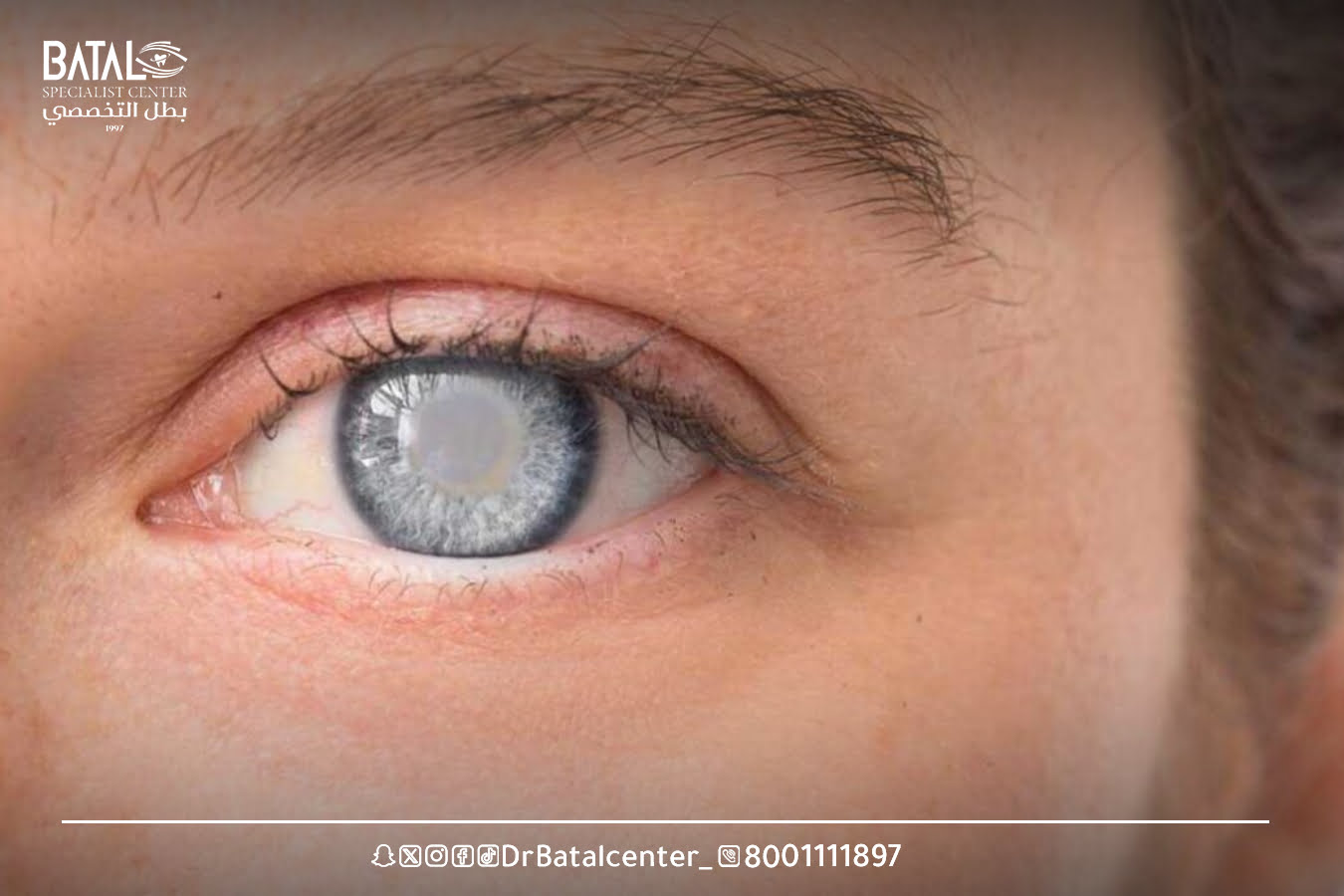
What is the process of removing cataracts ( cataracts) and implanting lenses inside the eye?
For patients with cataracts, surgery is the only treatment option. During cataract removal, the surgeon removes the patient’s opaque natural lens and replaces it with a clear artificial intraocular lens (IOL).
There are several types of intraocular lens (IOL) implants available. These include custom lens implants, which can help improve your vision after surgery.
Book an appointment with an ophthalmologist at Batal Specialized Complex in Jeddah and learn what custom lens implants are, the different types of custom lens implants available, and what you should consider when deciding whether custom lens implants are suitable for you or not.
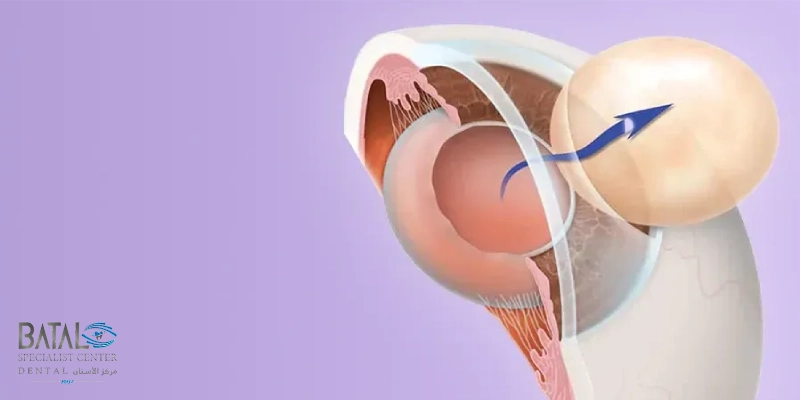
Types of lenses used in cataract surgery
There are several types of lenses available for cataract surgery, as follows:
monofocal lenses
- This is the most common type of intraocular lens (IOL) or cataract lens.
- Monofocal lenses have a single focusing power, which means they can provide clear vision at a distance, usually distance vision.
- Patients who have had monofocal intraocular lenses placed may still need glasses or contact lenses for near vision.
Multifocal lenses
- These IOL lenses have several different focusing powers built into the lens, allowing patients to see clearly at different distances.
- Some patients who have had multifocal intraocular lenses placed may not need glasses or contact lenses after surgery. However, they may experience some glare or halos around the lights at night.
Corrected lenses for astigmatism
- These intraocular lenses are designed to correct astigmatism.
- Astigmatism is a common condition that causes blurry vision due to the irregular shape of the cornea.
- Toric IOLs have different focusing capabilities in different parts of the lens. This allows them to correct distorted vision caused by astigmatism.

Adaptive vision lenses
These lenses are similar to your natural eye lenses in that they adjust their shape to help you see objects near or far.
Adaptive lenses are another option to help reduce dependence on glasses, but you may prefer to use glasses if you read or focus on close objects for longer periods of time.
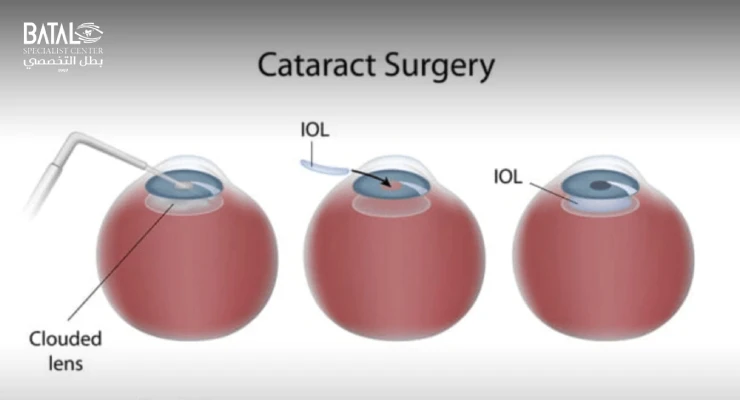
White water and lens implantation procedures
The cataract and lens implantation process contains some steps, including:
There are a number of different procedures for cataract surgery and lens implantation, as follows:
1. Phacoemulsification or “phaco”
- A small incision measuring 2 to 2.5 mm is made in the eye.
- A special device that uses high-frequency ultrasound energy is used to soften and loosen the cataract so that it can be removed by suction.
- An experienced surgeon using the latest phacoemulsification techniques can successfully perform the surgery within 10-15 minutes.
- The procedure is painless, without injections and does not require suturing.
- Usually the patient can see clearly within one day.
- New phacoemulsification techniques have significantly reduced the risks of cataract surgery, making cataract surgery one of the safest surgical procedures.
- At Batal Specialist Complex in Jeddah, this is our standard method for cataract surgery.
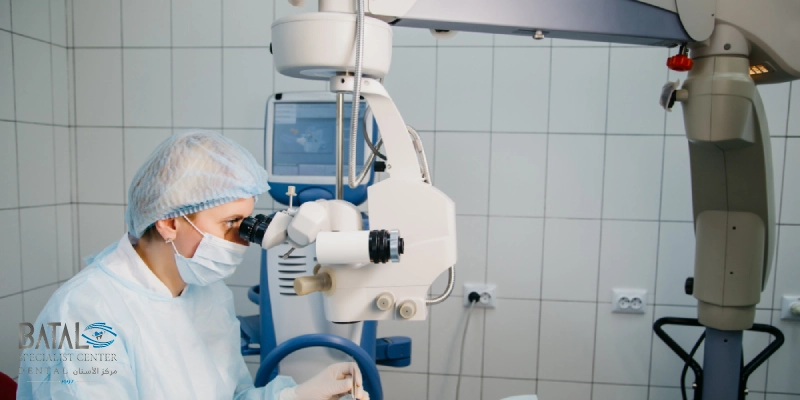
2. Femtosecond laser cataract surgery
In traditional “faco” surgery, the surgeon uses a blade to enter the eye, ultrasound to disassemble the cataract lens,
It then absorbs the lens parts to prepare the eye for implanting a new transparent lens.
In the laser method, no blade is used. Instead, the surgeon uses a precise, computer-controlled femtosecond laser beam to facilitate lens removal with minimal use of ultrasound energy.
These lasers allow for consistency and computer-controlled laser precision ensures precise surgery.
At Batal Specialized Complex, we give you the option to undergo laser cataract surgery.
3. Extracapsular surgery
This is an old method by which a larger incision is made in the eye.
The cataract is then removed in one piece. Due to the large size of the wound, suturing is required and thus the recovery time is longer.
In addition, the rate of surgical complications is higher with this older technique.
At Batal Specialist Complex, we do not routinely perform extracapsular cataract surgery.
Recovery stages after cataract surgery and lens implantation
Recovering from cataract surgery and lens implantation is not as scary as it may seem. In fact, the majority of patients experience minimal discomfort and a rapid return to their normal activities. However, there are certain things you can do to help ensure an increased success rate of cataract surgery.
- After cataract surgery and lens implantation, it is common to experience some fluctuations in vision as your eye adjusts to the new lens.
- Your vision may be blurry at first, but it should gradually improve over several weeks or months as your eyes adjust.
- Your eye doctor may need to adjust your eyeglass or contact lens prescription to achieve the best possible visual result.
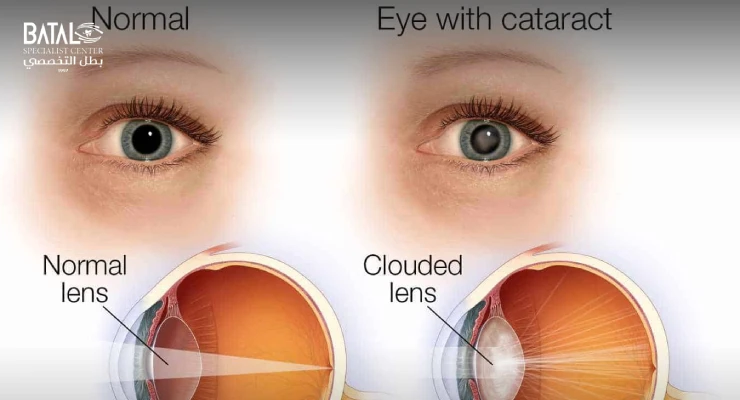
The best types of intraocular lenses to improve vision after surgery
Folding lens implantation allows vision to be restored quickly and in many cases enhances or improves the patient’s vision. With the advancement of today’s technology, surgeons can often choose a specific strength to implant a folding lens after cataract removal to reduce the patient’s myopia or farsightedness. This may not only restore vision, but also improve vision remotely without glasses after cataract surgery.
The latest development in intraocular lens design is multifocal lenses. These lenses are designed to provide excellent distance vision and functional visibility for close missions without the need for glasses. Ask your surgeon at Batal Specialist Complex if this option is right for you. Different IOL options will be discussed with you in detail during the evaluation.
After cataract surgery and lens implantation
After cataract surgery and lens implantation, there are some procedures that must be followed:
Eye care
Here are some tips to improve your recovery from cataract surgery:
- Use the eye drops prescribed to you according to the instructions.
- Use a protective eye shield at night for at least a week after the procedure.
- Don’t rub your eyes.
- Use appropriate pain relievers.
- Shower and shower as usual, but be careful to avoid soap or shampoo getting into your eyes.
- Avoid swimming.
- Wear your old armor, glasses, or sunglasses outside.
- Avoid sports and other activities that may lead to eye injury.
- Avoid driving until your vision becomes satisfactory.
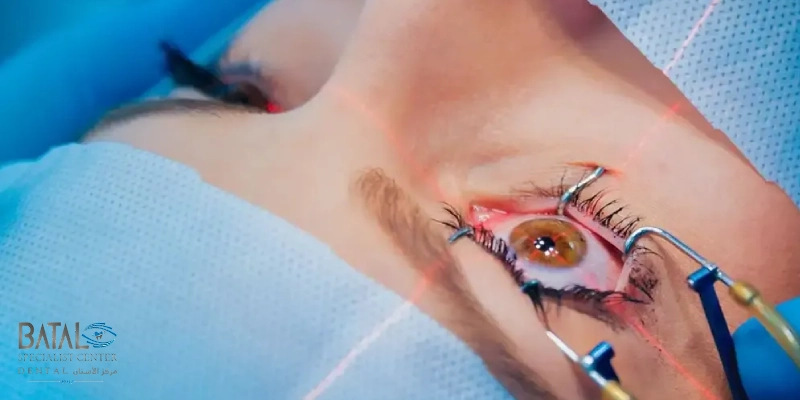
Follow-up
The first follow-up visit is usually within the first few days after surgery to check for any immediate complications and ensure proper recovery.
Subsequent follow-up appointments can be scheduled 1 week, 1 month, 3 months, and 6 months after the procedure to evaluate vision, intraocular pressure, and overall eye health.
During these appointments, your eye doctor will perform various tests, such as measuring visual acuity, checking for any signs of inflammation or infection, and evaluating the position and clarity of the implanted lens.
The cost of cataract surgery and lens implantation in Jeddah
The cost of cataract surgery and lens implantation can vary depending on several factors, including:
1- Geographical location:
- The cost of medical procedures, including cataract surgery, can vary greatly depending on the region or country in which the surgery is performed.
2- Type of lens implantation:
- The type of intraocular lens (IOL) implanted during surgery can significantly impact the overall cost.
- Standard monofocal lenses are generally less expensive than premium lenses, such as multifocal or toroidal lenses, which are designed to correct refractive errors or provide improved near- and distance vision.
3- Surgical facility:
- The cost may be affected by whether the surgery is performed in a hospital, or in a private ophthalmology clinic.
4- The surgeon’s experience and expertise:
- The experience and level of expertise of the ophthalmologist performing the surgery can also affect the cost.
- Surgeons with more comprehensive training and a proven track record may charge higher fees.
5- Insurance coverage:
- The cost of cataract surgery can be partially or completely covered by health insurance, depending on the patient’s plan and the specific details of the procedure.
Why choose Batal Specialized Complex for White Water Surgery
At Batal Specialized Eye Complex in Jeddah, we provide the latest cataract surgery and lens implantation techniques under the supervision of an elite group of certified ophthalmology consultants.
We use phacoemulsification (Vaco) and femtosecond laser technologies to ensure the highest levels of safety and accuracy, with a variety of advanced lens options such as multifocal lenses and toroidal lenses to correct aberration.
We accompany you step by step from diagnosis to full recovery with personalized service and integrated medical care that gives you a comfortable experience and clear, lasting results.
Book your appointment today at Batal Specialized Complex in Jeddah, and prepare to regain your vision clearly and confidently with the best eye experts in the Kingdom.



